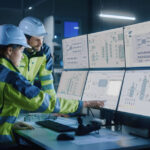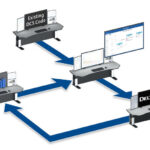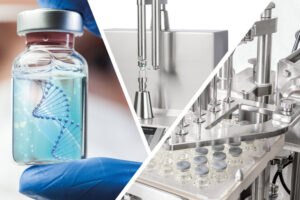What is the main reason for companies to modernise their process automation and control systems?
Guido Wink: It‘s a huge pressure on the industry coming from economical factors. The plants need to work more and more efficient, more data is required for sustainability reporting, and if you look at the work force, old work force is retiring, and new professionals are hard to find. What we see in the companies, is that a lot of the systems are so old –sometimes 20 to 30 years – that the technology, and also the knowledge for a smooth operation is no longer available. That was the time of Word Perfect 5.1 and Windows NT and that is still the technology some of our customers‘ plants are running on. So there is an enormous pressure on the industry to modernise their control systems to make data available at the right place.
Why have the systems not been modernised for so long?
Wink: Because it‘s complex to change the whole process control architecture. Over these 20 to 30 years, a lot has changed in the systems, but the current employees don‘t know exactly all the changes in the programming and in the codes that have been done. Not every field device is connected anymore. All this kind of changes are a huge risk, when transfering the control system into a modern one. That‘s why, in contradiction to IT systems, they didn‘t want to touch it. It‘s risky and there‘s too much investments required.
However, modern devices are often already installed at the field device level, for example, so why were investments made here?
Wink: Yes, regarding the field devices, they are generally in a more modern condition, because it is much easier to replace a field device. If the device didn‘t work anymore it‘s already been replaced by a version which e.g. has WirelessHART, and all the latest technologies. That has been done all over the time. But the process control systems haven‘t been touched. And so the data from the field often cannot be made available in the upper management levels. It is then not possible to transfer the data to the cloud or make it available for remote applications and analyses. The big challenge for our customers now is to touch the legacy obsolete process control system and replace it with a modern, cloud-based system such as DeltaV.
What are the requirements for modernisation with the Emerson DeltaV system?
Spilsbury: It doesn‘t matter if our customers have Emerson devices or devices from competitors in their field. Also the obsolete control system can be an old Emerson system or e.g. from Honeywell or Siemens. We can always realise the transition from the legacy system to a modern system with low risks and manageable investment costs. Tools such as DeltaV Revamp or DeltaV IO.Connect help with the migration.
What are the advantages?
Wink: First of all, it is important to have a look at all assets in the plant and their status in order to obtain an accurate picture of the existing instrumentation and control technology of the entire plant. The cloud-based DeltaV Revamp software solution is helping to analyse the old code of a field device, for example. The software offers a fully integrated digital workflow that utilises the power of artificial intelligence. DeltaV Revamp automatically converts the logic of the existing control system into a fully tested and documented control system database. The corresponding results are then fed into the standard project planning platform. From the results, project teams can see to what extent the conversion of the existing code can be automated and how much needs to be created and revised manually. Based on this data, the transition to complete DeltaV systems with decentralised control and safety-oriented system instrumentation can then take place.
What role does DeltaV IO.Connect play in the migration?
Wink: DeltaV IO.connect uses the I/O systems of the legacy system so you don‘t have to touch certain areas in the plant, especially in the field, during the transition process. In this way, the system can be migrated in a very short time. If all the steps have been well prepared, we are talking about a few weeks of system downtime compared to months with the conventional approach.
What is the feedback you get from your customers about the benefits of modernising with DeltaV?
Spilsbury: The CAPEX investment really has to pay off as early as possible and the new technology then needs to be a platform for the future. Once the systems have been implemented, very often our customers give us the feedback that the investment in DeltaV technology improves their efficiency, tied to leading to better energy management, reduction in batch cycle times, removing qualitative defects, and allowing access to information that can drive better performance of the field devices.
Wink: What we also often see is: When customers finished a modernisation project and see the benefit, they are starting a sort of programme with Emerson to modernise all their systems at multiple sites worldwide. In this way they certainly can make sure that in all the plants the same system is running, with the same operating philosophy, and the same maintenance philosophy. If customers are collecting data worldwide, they have the benefit to have access to all the the sides, to see how the sites are running, and how the systems are running.
Which sectors do the majority of customers come from?
Wink: We have programmes with life science customers, but also in the chemical industry as well as in oil and gas and in the power industry. We are very strong in all market segments, so that‘s absolutely a strong point for us.
Spilsbury: But they all have their own unique challenges, e.g. pharmaceutical regulatories, environments which are changing, a different philosophy in terms of sustainability, so they‘ll all have different benefits from the technology. Even if it reduces the risk of downtime that‘s the minimum people should accept from an investment in the new technology. This means that all customers want different benefits from DeltaV technology and we do our best to fulfil these requirements.
Can you name a succesful modernisation project?
Spilsbury: There is a trend towards greater sustainability in the chemical industry. Lyondellbasell in Wesseling, for example, selected Emerson to modernise the control systems and software at the company‘s Wesseling site in Germany. To this end, a legacy system was converted to DeltaV. The driver behind that was actually that they they‘ve changed from a traditional feedstock to a green or sustainable feedstock which then meant they had to modernise their control system infrastructure to support a different processing philosophy. The implementation of the new automation technology will help to improve operations at the production facility.
Emerson, Ratingen, Germany
The interview was conducted by: Daniela Held
Editor
The tool: Cloud-based Software
The cloud-based software solution DeltaV Revamp manages the transition from legacy applications to new control systems. Native backups from the legacy system are loaded into the software, which then uses artificial intelligence to compare the control system logic with an extensive knowledge database from past projects. If the AI identifies elements from previous projects, it extracts this logic and structures it in order to transfer it to the new control system. The software automatically converts the control system logic into a fully tested and documented control system database using the manufacturer‘s or end user‘s technical standards. As this is an automated process, errors are eliminated. The corresponding results flow into the standard project planning platform. The complete digitalisation of the workflow enables tests to be carried out earlier and projects to be completed more quickly and easily.
DeltaV Revamp is used to scan the legacy system‘s code and generate a comprehensive project report from which project teams can see to what extent the conversion of existing code can be automated and how much needs to be created and revised manually. These parameters help the teams to budget and harmonise the project. Another advantage of the digital modernisation tool is its speed. Instead of sending files back and forth by email, teams can upload data to native cloud tools. The results are usually available within minutes rather than days. The new automation is not just a simple conversion of the existing system. Instead, the project team receives a functional re-implementation of the control logic into the new control system, which also includes all the necessary elements for advanced features such as condition-based control, advanced control, dynamic alarming and abnormal operation optimisation. This means that when upgrading a control system, there is no longer any need for a major overhaul to implement the new technologies available.









